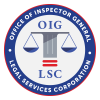
12,594
Open Recommendations
Open Recommendations
Age of Recommendations
3K Open Less Than 1 Year
6K Open Between 1-5 Years
2K Open More Than 5 Years
Date
Federal OIG
Report Title
Type: Type

Commodity Futures Trading Commission OIG
Audit of the CFTC's Enterprise Risk Management Program.
Type:
Audit

Department of Housing and Urban Development OIG
LoanDepot.com Did Not Have a Sufficient Quality Control Program for FHA-Insured Loans
Type:
Audit

U.S. Agency for International Development OIG
Financial Audit on USAID Resources Managed by the African Institute for Development Policy Under the Building Capacity for Integrated FP/RH and PED Action Project for the period October 1, 2023, through September 30, 2024
Type:
Other

U.S. Agency for International Development OIG
Construction Sustainability: USAID/Pakistan Did Not Ensure That Recipients Could Use, Operate, and Maintain the Selected Water Supply System and Schools as Intended
Type:
Audit

Legal Services Corporation OIG
Audit on Selected Internal Controls at Lone Star Legal Aid
Type:
Audit

